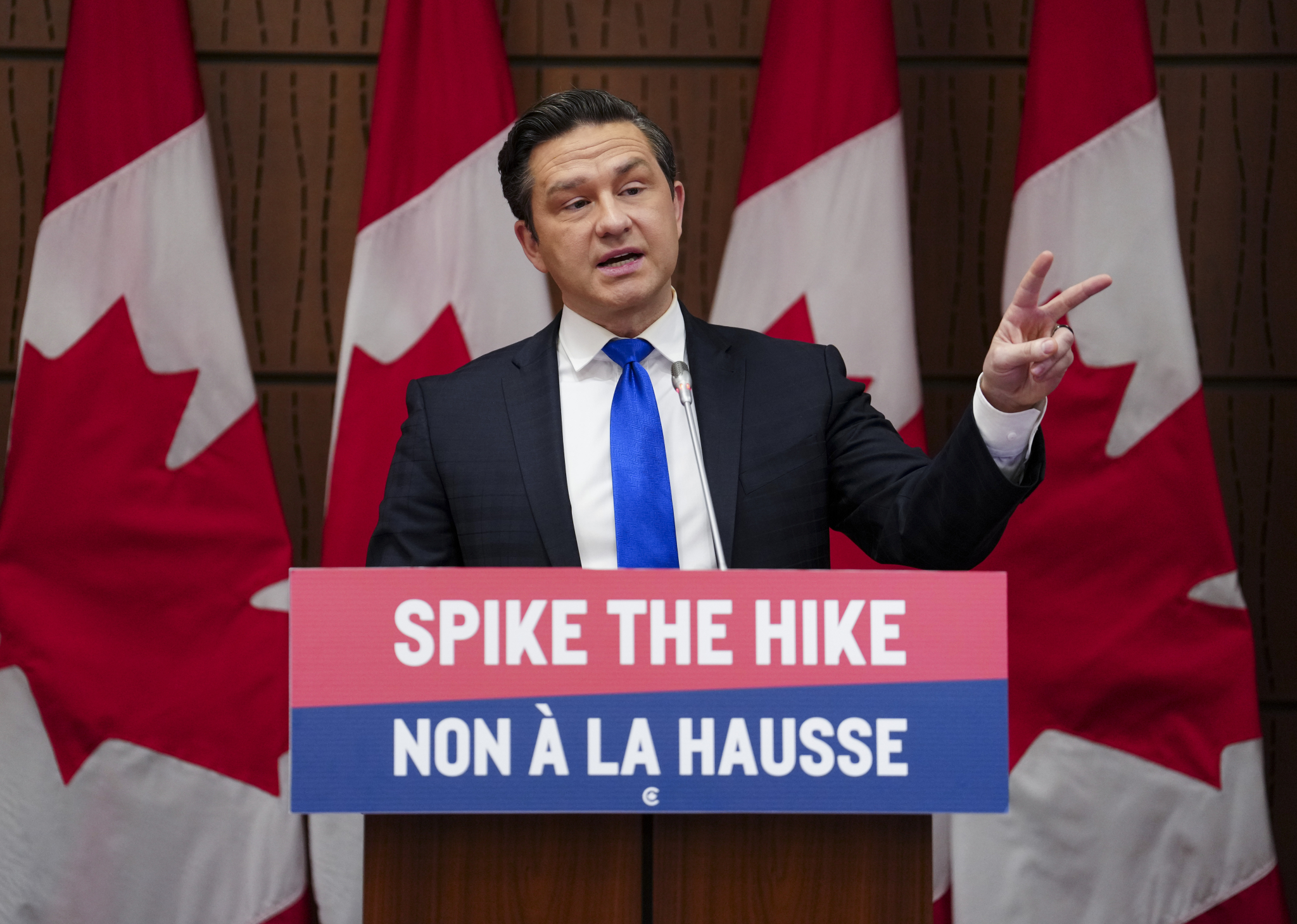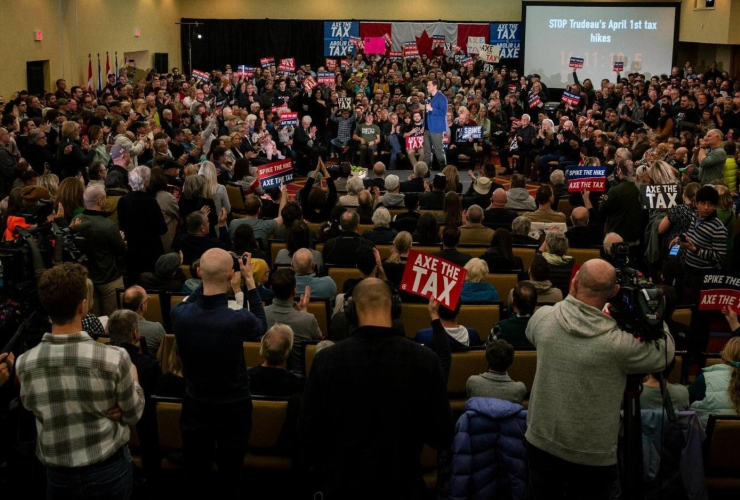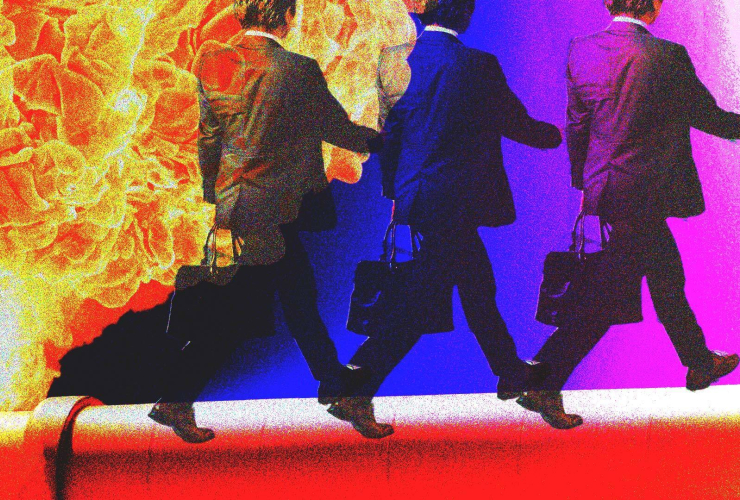Conservative Leader Pierre Poilievre’s motion of non-confidence over the federal carbon price likely won’t topple the government, but it doesn’t have to in order to serve the Conservative party agenda, political experts say.
“This has been a number one story, so it's a win for them, regardless of what the outcome is,” said Alex Marland, a professor of Canadian politics at Acadia University.
“I think the goal is to frame the election as a carbon tax election, which is different than framing it as the Trudeau election,” Marland said. Poilievre’s goal is to ramp up pressure on this hot-button topic until April 1 and, ultimately, try to split off some Liberal MPs or create division within that party, he added.
There is no shortage of pressure. Poilievre and premiers from seven provinces have stepped up their attacks on the carbon tax as April 1 — the day the federal carbon price will increase from $65 to $80 per tonne — fast approaches. Last week at an “axe the tax” rally in Corner Brook, N.L., Poilievre took shots at the province’s Liberal MPs, calling them the “silent six” for keeping quiet in the days after Newfoundland and Labrador Premier Andrew Furey called on the federal government to pause the price increase, noted Marland.
This non-confidence motion is just one of many tactics to keep exploiting a wedge within the Liberals, said Marland. The Conservatives have claimed victory once already when the federal government made the contentious decision to implement a three-year exemption on home heating oil after facing internal pressure from its Atlantic MPs and the federal Conservatives.
In October, N.L. Liberal MP Ken McDonald, who has previously voted against his party on carbon pricing motions, criticized his party’s approach in Atlantic Canada on CBC News’ Power & Politics program in October. Then, he kicked off the new year by suggesting it's time for a leadership review of Prime Minister Justin Trudeau but later backed away from those remarks.
Poilievre’s motion of non-confidence, which calls for the “House to be dissolved so Canadians can vote in a carbon tax election,” is unlikely to shatter the NDP’s agreement to prop up the Liberals, so it likely won’t succeed, said Marland.
Framing the next election as a “carbon tax election” instead of a vote against Trudeau allows the Conservatives to stick to their message even if Trudeau did step down and it makes it easier to attack the NDP, he said.
With so many premiers and provincial parties opposing the carbon price increase, this is the federal Conservatives’ moment and they're making the most of it by putting the NDP, in particular, in an awkward spot, Lisa Young, a political scientist at the University of Calgary, told Canada’s National Observer in a phone interview. It forces the NDP to prop up the Liberal government at the same time as Poilievre “is really making a bid for traditional NDP voters, in some ways, with this talk about the working class,” said Young.
“Presumably, at the local level, in places where it might matter, this is going to be used to bludgeon the NDP candidate that their party voted to keep the carbon tax.”
She added provincial NDP parties have been part of the “unravelling of support for the carbon tax.” For example, the Saskatchewan NDP supported the provincial government’s plan to stop paying the federal carbon price levy it owes Ottawa. Premier Scott Moe’s government officially stopped collecting the carbon tax on Jan. 1.
The political machinations over carbon pricing prompted eight Canadian environment and climate organizations this week to call out “some federal politicians and many premiers” for “shamelessly exploiting Canadians’ very real economic pain for political gain.”
“Climate policies have nothing to do with the hardships Canadians are facing, yet these politicians are ignoring the real causes of the cost of living crisis and scapegoating carbon pricing,” reads the statement issued March 20 by Climate Action Network Canada, Environmental Defence, Greenpeace, Équiterre, the Canadian Association of Physicians for the Environment, the David Suzuki Foundation, Ecojustice and the West Coast Environmental Law Association.
“It is clear to us that the debates and votes held in Parliament this week calling for a freeze on long-planned carbon pricing increases are part of a concerted effort to dismantle more than just carbon pricing: they are part of an ideologically driven effort to limit all climate action.”
The statement warns that these attacks undermine Canada’s climate plan as a whole and would allow multinational oil and gas companies to continue polluting without consequence.
Ultimately, staying in the news and keeping pressure on the government is a big deal for any opposition party, and clearly, the Poilievre’s Conservatives are achieving this, said Marland.
Natasha Bulowski / Local Journalism Initiative / Canada’s National Observer
That any of this stupid crap
That any of this stupid crap is politically viable comes down to a media oligopoly owned by the right wing.
When the conservatives go on
When the conservatives go on the attack, carbon pricing can still stand as long as progressive politicians defend it.
It's when progressive politicians fail to defend carbon pricing that the roof caves in. For that, federal and provincial Liberal and provincial NDP politicians are to blame.
The Liberals' exemption on heating oil sabotaged their signature climate policy. An own goal.
"The only thing necessary for the triumph of evil is for good men to do nothing."
On climate, the federal Liberals and provincial NDP do far worse than nothing. They build pipelines, greenlight LNG projects, approve offshore oil projects — and insist we need to sell fossil fuels in order to transition away from fossil fuels. Worse, they abandon science and lead their followers over to the Dark Side. Putting a progressive stamp on petro-politics and implicit climate change denial.
When it comes to "climate villainy", right-wing politicians and climate change deniers are noisy but ineffective. When centre-left leaders join in, that's when the fire takes hold and spreads.
Well said....the problem is
Well said....the problem is that the Canadian electorate is woefully ill-informed, and dare I say, lazy. They have no understanding of the politics in the country, they are unable to put 2 and 2 together, they are unwilling to make any sacrifice to improve the lives or status of others. I am speaking in generalities here, but the destruction of virtually every social service/safety net before our very eyes is not enough to wake them up. I read the book Fire Weather and have been paying attention to what is happening in the West ever since. HOW can Canadians and Albertans in particular not be concerned that the forest fires of 2023 are still smoldering as there was not enough snow cover to snuff them out, AND HOW can they in the face of a drought that they have already been warned to ration water for, are they quibbling over a "carbon tax". Their concern shouldn't be "axe the tax", their concern should be "save my ass" from fire and drought! This on top of the fact that Canada will continue to have the worst air quality in the world due to fires this year and in the coming future. But lets get in those cars and drive, drive, drive. I am disenchanted with my country and the woeful leadership we have. Trudeau really dropped the ball, first by buying a pipeline, and then by giving Atlantic Canada an out. This government has no credibility on this issue.
What? You can absolutely say
What? You can absolutely say that about the CPC but the Liberals having no credibility?! That's extremely "ill-informed" to say the least.
I thought you were arguing for more reason.
Well, I suppose one option
Well, I suppose one option would be to sit out the next election, or vote with my heart and throw an understanding of the consequences of our voting system out the window, or lodge a protest vote with some kinda independent no one's heard of before.
That is precisely the choice left in my competitive riding where any one of three parties could win. Vote splitting is a genuine and troublesome phenomenon.
This situation doesn't exist where one of the two big parties has a permanent lock on a particular riding. You could vote with your heart and conscience 'til the cows stop passing methane and the same old party will still win.
Armchair critics in these ridings can afford to lord over, criticize and guilt trip strategic voters elsewhere to death with no consequence to their own ideals.
But put them in a riding with a razor's edge between Liberal, NDP and Conservative candidates and they'd be lost on how to face the tyranny of majoritarian systems with no proportionality where voting for their their conscience candidate will have the opposite effect as intended by fragmenting the vote.
I will vote strategically when it is required no matter how large the Niagara Falls of verbiage and projected guilt is directed at me. I will never vote Conservative willingly or indirectly by punishing the Liberals and / or the NDP, especially when advised to do just that by naive critics who have never faced a three-way election challenge.
Despite the hard challenges
Despite the hard challenges of avoiding vote splitting in my riding at every federal election, I find consolation in the fact that the powerful economics of renewables are now starting to overwhelm the dependency on carbon fuels.
The severe disappointment of seeing Poilievre win will be somewhat offset by the knowledge that fossil fuel demand will plateau by the end of his first disastrous term as prime minister, and begin a long decline in his second.
His core support, of course, originates in areas where the fossil economy dominates. The temporary anti-Trudeau protest vote will probably disappear relative to the level of damage he does to our beloved social safety net.
I will be happy to note that I wasn't one of the voters seeking punishment on Trudreau (though I am very angry at his weak climate action) without having a good think about what would happen as the result.
With Poilievre in power, everything will be on the table in the Canadian economy and environmental and policy structures. Everything!
But the world outside Canada will ignore Poilievre's destructive objectives. He may well see the bottom drop out of the demand for Canadian petroleum, which is the lifeblood of conservatives across the land, while American renewable electricity displaces it with huge benefits that will bypass Canada while Poilievre remains in power.
With that depressing scenario at least we have our ideals and votes that can be nurtured and honed for the future.






Comments